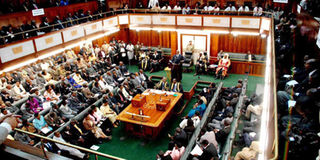Reforms: Battle to fix EC is lost in Parliament

KAMPALA.
In passing the Constitutional Amendment Bill 2015, Parliament effectively dashed any hopes of removing the president’s hands from the process of constituting the Electoral Commission, while also rejecting Opposition demands to overhaul the entire electoral body.
And as anticipated, the end result has had the debilitating effect of almost freezing all Opposition-to-government dialogue.
The process of appointing, firing and determining qualifications of members of the commission were at the heart and soul of a raft of demands drafted into a flagship document dubbed the Citizen’s Compact. The document was compiled by a bi-partisan group sitting together with civil society in the hopes that it would enhance the chances of free and fair elections next year.
The proposal to amend Article 60 and put the procedure of appointment and firing members of the commission in the hands of the Judicial Service Commission was suggested to ensure that politicians are kept at bay in choosing who watches over the ballot.
The Citizen’s Compact had also suggested that questions for the removal of commissioners of the EC be addressed by a tribunal appointed by the Judicial Service Commission.
The Opposition had also tabled a specific clause to stop the current tendency where government cronies who lose elections are rewarded with posts at the electoral body, inevitably denting its credibility.
“A person shall not be appointed to the Commission if that person has stood at any one time within the preceding five years, held office or stood for election as a Member of Parliament, a member of a local government or a member of a governing body of a political party or political organisation,” proposed an amendment to Article 60.
The core of the current leadership at the EC is of NRM-leaning politicians-turned election managers, who were sent to handle elections after they lost bids at elective office.
Proponents of shielding the Commission from politicians who lose elections argued that it would boost the integrity of the electoral body, which has suffered at least two Supreme Court indicting rulings for contravening presidential electoral laws.
A proposal to have members of the commission serve a non-renewable seven-year term to avoid situations of complacency was floated. Currently, the commissioners at the EC are serving their second 7-year term that ends in late 2016. However, the government, with the aid of the arithmetical advantage of ruling party MPs, rejected this proposal and instead insisted on changing the name of the Electoral Commission while questions of removal will still be dealt with by a tribunal appointed by the President.
The Leader of Opposition in Parliament last week confirmed that, well aware of the numerical strength commanded by the NRM in Parliament, the Opposition were willing to talk to government to test the possibility of a compromise on how the matter of the Electoral Commission could be resolved.
With the Opposition minority report shelved for debate after failed attempts by Jinja Municipality East MP Paul Mwiru, the government’s opponents’ hopes now rest entirely with pending specific amendments to particular electoral laws which are in the offing.
The broader goal of achieving far-reaching reforms was also not met. The best the Parliament’s Legal Committee could come up with was a recommendation for the establishment of a Constitutional Review Commission to look at wider proposals including demands to reinstate term limits.
But the Bill also laid bare the failure of the Opposition to pull in the same direction as some Opposition MPs were unaware which way to cast their ballot at the critical stage for Second Reading.
What we saw in Parliament last week was a demonstration of some self interests. With majority NRM members who lost elections in the tumultuous 2010 party primaries, both NRM MPs and NRM-leaning Independents enthusiastically supported an amendment to allow the crossing to and from different political parties 12 months before the election.
This amendment will allow NRM-leaning independents produced by the botched 2010 primaries to secure the nomination of the ruling party for elections. It flies in the face of a Constitutional Court ruling that ruled that it was “invalid, null and void” to nominate about 70 (mainly) parliamentary candidates for the 2011 elections on platforms different from those they had been elected on in 2006.
It was in the same spirit that a government proposal to amend Article 72 and place a requirement of 1,000 signatures for candidates intending to contest as independent MPs was rejected by both ruling party and Opposition MPs on grounds that it is “discriminatory” and “impractical” as some constituencies have less than 1,000 voters.
Rejected:
A proposal to amend Article 15 to create City Land Boards was turned down as it offends the subjudice rule because of an ongoing court case against Kampala Capital City Authority for disbanding the Kampala Land Board.
MPs also warned that the government could be using city boards as a ruse to circumvent entities like the Uganda Land Commission and aid cunning investors to grab urban land.
The government proposal to amend Article 144 of the Constitution to increase the retirement age from 70 years to 75 years in the case of Justices of the Supreme Court and the Court of Appeal and from 65 years to 75 years in the case of judges was also turned down.
MPs argued that it would make the growth of young lawyers in the Judiciary difficult while also demoralising judicial staff.
The passing of the Bill brought to an end weeks of unrest and discontent after ruling party MPs quietly threatened to join the Opposition in rejecting it over a dispute about new constituencies. The next phase awaits.




